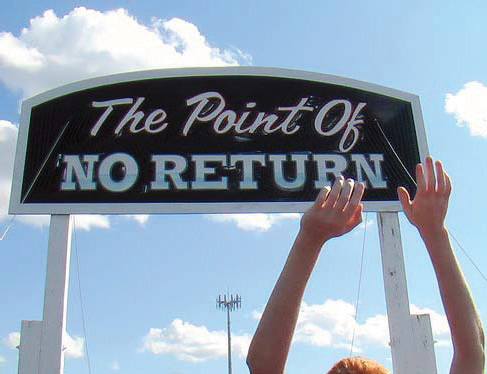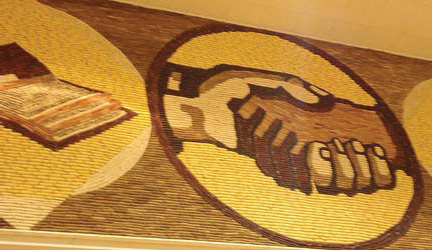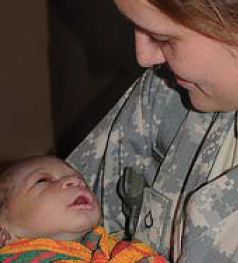This is “Case Studies”, section 4.8 from the book Business Ethics (v. 1.0). For details on it (including licensing), click here.
For more information on the source of this book, or why it is available for free, please see the project's home page. You can browse or download additional books there. To download a .zip file containing this book to use offline, simply click here.
4.8 Case Studies
I Wouldn’t Change a Thing

Source: Photo courtesy of Patrick Hawks, http://www.flickr.com/photos/pathawks/796254651/.
Tamica Tanksley graduated from Temple University in Philadelphia in 2000. About a decade later she worked her way into an important role in the office of Pennsylvania State Senator Vincent Hughes: she’s codirector of his community affairs outreach and efforts. Though not a celebrity or mightily important in politics, what she’s done with her life up to now earned her a brief write-up and a chance to answer a few interview questions in Temple’s Internet Alumni magazine.“Tamica Tanksley, SCT ’00,” Temple University, accessed May 12, 2011, http://www.myowlspace.com/s/705/index.aspx?sid=705&gid=1&pgid=1021&cid=1612&ecid= 1612&ciid=3725&crid=0.
She describes her job responsibilities as linking the senator with “community leaders, educators, religious organizations, constituents and various institutions within the public and private sector.” It all comes naturally to her. As she puts it, “I didn’t choose politics, politics chose me. And if I had to do it all over again, I wouldn’t change a thing.…Working in the government sector where my daily responsibilities afford me the opportunity to empower and inspire everyday people is a career that ignites my passion for people.”
It’s not just heavy, public service trudging, though; Tanksley also finds the job “fun” because it allows her “creative juices to flow into a sea of possibilities,” and in a different part of the interview she calls the work, in a sense, victorious: “As a citizen and voter, I’ve learned that this game of life is not won by standing on the sidelines. In order to provoke change and improve the quality of life for everyone, we must get into the game because victories are won on the field.”
How’d she get the job? The way a lot of people start off in politics, by serving in that same office as a volunteer worker.
Finally, since it’s a Temple University website, the interviewer tries to get in a plug for the school and succeeds with this memory Tanksley produces of Dr. Jean Brody’s public relations course and the prof’s infamous (at least on the Temple campus) red pen: “While I was often saddened by my white paper being flooded by red pen marks, I quickly learned that Dr. Brody and her red pen refined the best in me. With each passing assignment, the red marks lessened and my knowledge and experience increased. Moreover, it was the red that encouraged me to do my best work, which has ultimately contributed to the dedicated worker I am today.”
Questions
-
Tanksley reports about her young life up to this point that “if I had to do it all over again, I wouldn’t change a thing.” Can you use this as a point of departure for
- defining Nietzsche’s eternal return and showing how it works?
- characterizing Tanksley’s professional life as one fit for approval by Nietzsche’s eternal return?
- The values guiding Wallace Souza’s work as a news reporter in remote Brazil—especially the kinds of images judged appropriate for TV there—are quite different from those guiding TV reporting in the United States. Why does Nietzsche believe this kind of cultural clash is a reason to subscribe to the eternal return and simultaneously abandon traditional ethical theories, which attempt to pertain universally?
- Tanksley reports about her young life up to this point that “working in the government sector where my daily responsibilities afford me the opportunity to empower and inspire everyday people is a career that ignites my passion for people.” How might an advocate of the eternal return respond to this sentiment? Explain.
- Whose life seems more in tune with how you imagine yourself living the eternal return, Souza’s or Tanksley’s? Why?
-
For virtue ethics, knowing what to do with your life—responding to its problems, choosing goals to reach for—isn’t something you can just figure out no matter how intelligent you may be or how many ethics classes you’ve taken. To succeed, you also need a good society, one that does two things:
- Teaches the virtues through its institutions
- Provides a way to practice using the virtues
How could Dr. Jean Brody be considered a teacher of virtue? What particular virtues did she teach Tanksley, and how did she provide a way to practice using them?
Mordidas

Source: Photo courtesy of Myki Roventine, http://www.flickr.com/photos/myklroventine/847530903/.
In Mexico City, police salaries are extremely low. They live decently enough, though, by adding bribes (mordidas in Spanish) to their wages. During a typical week they pull in bribe money that more or less equals their monthly salary. All the locals know how it works, especially when it comes to the most avid collectors, the traffic cops. In the standard procedure, the officer pulls a car over, takes out his codebook, walks up, and hands it to the driver. Ostensibly, he’s allowing confirmation that the law actually prohibits whatever was done. This is what actually happens: the driver slips about fifty pesos (a little under five dollars) into the book, closes it, hands it back, and is free to go.Business Ethics Workshop video, accessed May 12, 2011, http://businessethicsworkshop.com/Chapter_4/Mordida%20in%20the% 20booklet.html. The practice is so routine that frequently the procedure is abbreviated and participants don’t even bother trying to hide the payoff or going through the codebook pantomime. They may approach the officer’s patrol car and directly drop the money onto the guy’s lap.Business Ethics Workshop video, accessed May 12, 2011, http://businessethicsworkshop.com/Chapter_4/How_to_purchase_a_police_ officer.html. Or they may stay in their own car and just hand cash out to be directly pocketed.Business Ethics Workshop video, accessed May 12, 2011, http://businessethicsworkshop.com/Chapter_4/Quick_mordida.html. Regardless, the transaction is smooth and efficient.
Despite the bribery’s efficiency and its penetration to society’s core, not everyone in Mexico City is happy with the constant mordidas. According to a story in the city’s largest circulation daily, a mayor in one of the suburbs decided to take a lonely stand against the informal police action. Since all the police are in on it, he couldn’t resort to an Untouchables-styled internal affairs operation. And since all the citizens considered the payoffs perfectly normal, he couldn’t appeal to them for help either. Really, he was left with only one choice. To interrupt the habit, he made traffic tickets illegal. His suburb became a free driving zone where anybody could do whatever they wanted in their car and the police couldn’t respond. A lot happened after that, but there’s no doubt that the payoffs stopped.Alejandro Almazán, “Fin de la mordida,” El Universal, November 16, 2003, accessed May 12, 2011, http://www2.eluniversal.com.mx/pls/impreso/noticia.html?id_nota= 54910&tabla=ciudad.
Questions
-
About the bribery in Mexico City, not only is it the way things have been done as long as anyone can remember, but the process actually makes a lot of sense; it’s even very economically efficient because the middlemen are being cut out. Instead of having to pay an administrative staff to process traffic tickets, then accept deposits into the city’s account, and then redistribute the money back out as part of police salaries, here the money goes straight into the officer’s pocket.
- What is cultural relativism, and how does the vision of ethics associated with it diverge from the traditional ethical theories?
- The Mexico City process of getting and paying off a traffic ticket is different from the US process. What values and advantages can be associated with the process in Mexico City? How can it be justified in ethical terms?
- The Mexico City process of getting and paying off a traffic ticket is different from the US process. What values and advantages can be associated with the process in the United States? How can it be justified in ethical terms?
- The Mexico City process of getting and paying off a traffic ticket is different from the US process. How can that difference be converted into an argument in favor of the idea that cultural relativism is the right way to look at things? Does the argument convince you? Why or why not?
- Your company, FedEx, has sent you to Mexico to open a branch in Mexico City. You’ll be there for three months, with all expenses paid. Can you make the case with a culturalist ethics that FedEx should reimburse not only your car rental and gas but also the two mordidas you had to pay even though you obviously don’t have any receipts?
- After you return from your successful overseas experience, FedEx assigns you to train a set of recruits to go to Mexico and open more branch offices. When you to talk about the police and mordidas, would you counsel a culturalist approach, or would you advise them to go by the book (as that phrase is understood in the United States)? How would you justify your decision?
- For owners of office buildings in Mexico City, FedEx is a great client. They pay their rent every month and they’re probably willing to negotiate an amount in dollars, which is extremely attractive because the Mexican peso is prone to the occasional and steep devaluation. As a result, if you’re opening up a new FedEx office, you’re going to have building owners lining up, trying to rent you space. Does a decision to play by local rules and pay mordidas to cops also allow you to play by local real estate rules, which allow you to take a generous cash gift in exchange for renting in one building instead of the place across the street? Why or why not?
- You are sent to Mexico City to rent office space. You find two equally good spaces only distinguished by the fact that one owner offers a larger bribe than the other. No one’s watching, no one will ever know, you can do whatever you want. What do you do? Why?
-
Think of yourself as a virtue ethicist.
- Very quickly, what are some of the virtues you personally attempt to live by, and what social institutions played a role in shaping your character?
- If you were sent to Mexico on a work assignment and found yourself in the situation typically faced by local drivers after being caught driving a bit fast, how would you handle the situation? Which virtues might come into play?
- Most advocates of virtue ethics believe companies—like other organizations including schools, churches, and community associations—play a role in instilling virtue. If you were training FedEx recruits destined to open branch offices in Mexico City and you wanted to prepare them for the ethical challenges of bribery, what virtues would you seek to instill in them? Can you think of any life experiences that some recruits may have had that may have formed their character to respond well to the situation on the Mexican streets?
- The mayor in suburban Mexico City who decided to cancel traffic tickets was, in fact, fighting against what he saw as corruption. Most advocates of virtue ethics believe government organizations play a role in instilling virtue in its citizens. Could this action be considered part of that effort? What virtues might it instill? How would it help people become better practitioners of those virtues?
-
The video Mordida in the Booklet (http://businessethicsworkshop.com/Chapter_4/C4.html) shows a motorcycle officer getting paid off. One curious aspect is how long and intense the discussion stretches between the officer and the pulled-over driver. What they’re doing is negotiating the amount. The fifty peso price tag is a good average, but the number can drop or climb depending on the give and take.Business Ethics Workshop video, accessed May 12, 2011, http://businessethicsworkshop.com/Chapter_4/Mordida%20in%20the% 20booklet.html.
- What is the five-step process of discourse ethics? How could this bribery negotiation be understood within it?
- According to Transparency International’s Corruption Perception Index, Mexico is a place where people doing business make many informal agreements involving bribery, kickbacks, insider dealing, and all sorts of similar practices. Except for the fact that those involved are wearing suits, most of these scenes resemble the one between the motorcycle police officer and the driver: people talk for a while, come to a mutually satisfying, peaceful conclusion, and some money changes hands. Do you see this as an indictment of discourse ethics, a justification of the approach, or something else? Justify.
-
In the newspaper article about the Mexico City suburb where the Mayor decided to ban traffic tickets, the reporter interviewed a police officer described as “an old transit cop whose juicy bribes had helped buy his gold necklaces and bracelets.” This was the old cop’s reaction to the situation (translated from Spanish): “I got my buddies together and I told them, ‘This sucks, now what’re we going to do for money?’”
An ethics of care shifts the focus of moral thought away from the fair imposition of rules and toward the maintenance of immediate personal relationships. Ethics isn’t about treating everyone equally so much as it is about keeping companions together.
- Listening to this officer, who do you suppose exists within his web of social responsibility?
- Assuming this officer practiced the ethics of care, would he treat these two drivers differently after pulling them over: his nephew and some out-of-towner he’s never seen before? Why might he (not) treat them differently? Are there circumstances under which he’d actually demand more money from the nephew? What could those be?
- According to the newspaper article, in the first two months of ticketless existence in the suburb, about two hundred people were struck by moving vehicles, and twenty were killed. From the perspective of the ethics of care, can these numbers be used to form an argument against this policy and in favor of a return to the previous, corrupted reality?
Money for Nothing

Source: Photo courtesy of Richard Riley, http://www.flickr.com/photos/rileyroxx/2969244149/.
In his blog thezspot, author Z raises two questions about people receiving unemployment paychecks. Both are laced with suspicion of fraud. First, people who are collecting unemployment checks are required to show they’re at least trying to get a job, but Z writes that some are “showing up for interviews in jeans and t-shirts.” Then he asks, “Do these people really want the job, or are they just showing up to say that they are actively seeking work?”Business Ethics Workshop, accessed May 12, 2011, http://businessethicsworkshop.com/Chapter_4/Unemployment_fraud.html.
He goes from there to a second critical point. “Some people,” Z says, “are collecting unemployment checks even though they’re actually working.” What they do is turn in their unemployment form listing the days they worked, and those are deducted from the check they receive. That sounds OK in the abstract, but, he adds, “The problem is that these people who are ‘on call’ are not taking shifts that are offered to them. Those shifts don’t get deducted from their unemployment. So, while there are people who are actually unemployed, struggling and looking to find work, there are Union employees sitting at home deciding when they do and don’t want to come in. And collecting unemployment.”
From the posting’s response section, here are two contributions:
- It’s not easy for me to swallow that my taxes are supporting people who could be working.
- I have a question. I live in Wisconsin and I know of somebody who is collecting unemployment but is not actually going to any job interviews or is even applying for jobs. Is this illegal? If so, how can I report this without them knowing?
Questions
- If you were using the eternal return to chart your way through life, would you have any problem “sitting at home deciding when you do and don’t want to come in while collecting unemployment”? If you’re all right with that, how would you respond to the complaint from the response section that someone is paying taxes to support your lifestyle?
- Thinking about the people showing up for job interviews in jeans and t-shirts, what might be lacking in their character according to a virtue ethicist? If the government is one of those institutions proponents of virtue look to for the instillation of good character, what might the government do in this situation in the name of encouraging virtue?
-
The second cited response to Z is a question about how an unemployment cheat can be reported “without them knowing.”
- About this silent reporting, why is this not what a proponent of discourse ethics would recommend?
- How could the five-step process of discourse ethics be applied to the situation? Would the guy complaining about paying taxes be included in the discussion? What kind of proposals might be voiced to rectify the situation?
- Starting from the ethics of care, is there a situation you could imagine that would justify the actions of workers who take some shifts but decline others, and collect unemployment for those declined hours?
A Single Parent in the Army

Source: Photo courtesy of US Army Africa, http://www.flickr.com/photos/usarmyafrica/4034104565/.
The post of cook in the mess hall is probably one of the Army’s least dangerous assignments, the closest you get to actual battle is a food fight, but it’s still a military job where you go and do what your orders command. For Specialist Alexis Hutchinson, a twenty-one-year-old Army cook, that meant catching a flight to Afghanistan. She missed hers, though, intentionally. She regretted abandoning her unit, but felt she had no choice. The single mother of a ten-month-old, she says she couldn’t find anyone to care for her child during the absence; the only potential help, her mother, was already overwhelmed by caring for three other relatives with health problems. Hutchinson’s fear, according to her lawyer, was that if she showed up at the airport, the Army “would send her to Afghanistan and put her son with child protective services.”
For its part, a military spokesman says, “the Army would not deploy a single parent who had nobody to care for a child.”
The situation is under review, but for the present, just like anyone else who refuses deployment, she’s under military arrest on her base in Georgia.“Mother Refuses Deployment,” New York Times, November 16, 2009, accessed May 12, 2011, http://www.nytimes.com/2009/11/17/us/17soldier.html.
Questions
-
Virtue ethics
- The military is cited by virtue ethicists as a potential character-building institution, one of the places a society molds a good citizenry. What are some of the virtues the military could be expected to instill? How are those reflected in this situation?
- Families are a cited source of virtue. What values should we expect family life to instill? How are those virtues reflected in this situation?
- Is there any way to bring the military virtues and the family virtues together for Hutchinson? If so, what might it be? If not, why not and what should she do?
- Proponents of discourse ethics walk through a five-step process on the way to reaching a negotiated settlement to moral conflicts. What might the five steps look like here?
- One of the objections to discourse ethics is that it can set up a slippery slope—that is, the people involved can form a solution that bends the rules a little bit, and next someone else wants a little flexibility too, and then someone wants a little more, and before long, the rules have completely disappeared and everyone’s doing whatever they want. Could you sketch out how this process could happen here, with the end result being the Army more or less losing the values at the core of its existence?
-
Ethics of care
- One of the key elements composing an ethics of care and distinguishing it from traditional ethical theories is this: At the center of attention, independent actors are replaced by a web of interrelated individuals. Ethics, in other words, isn’t about me and you, it’s about us. In Hutchinson’s case, she finds herself in the midst of at least two networks of “us,” two communities of people to whom she owes an allegiance and care. Describe these communities and the links binding them.
- Another of the key elements composing an ethics of care and distinguishing it from traditional ethical theories is this: The impartial application of abstract principles is replaced by the maintenance and harmonizing of human relationships. Ethics, in other words, is less about the fair imposition of rules and more about crafting social integration. Can you find an example of this conflict between an ethics of rules on one side, and an ethics of relationships on the other, in Hutchinson’s situation?
- Another of the key elements composing an ethics of care and distinguishing it from traditional ethical theories is this: Tensions between the rights of individuals get replaced by conflicts of responsibility to others in established relationships. Ethical tensions, in other words, aren’t my rights versus yours, it’s me torn between those I care for. In the case of Hutchinson, how is she torn?
- In general, do you believe there’s a place for an ethics of care in the military? If so, where? If not, why not?




